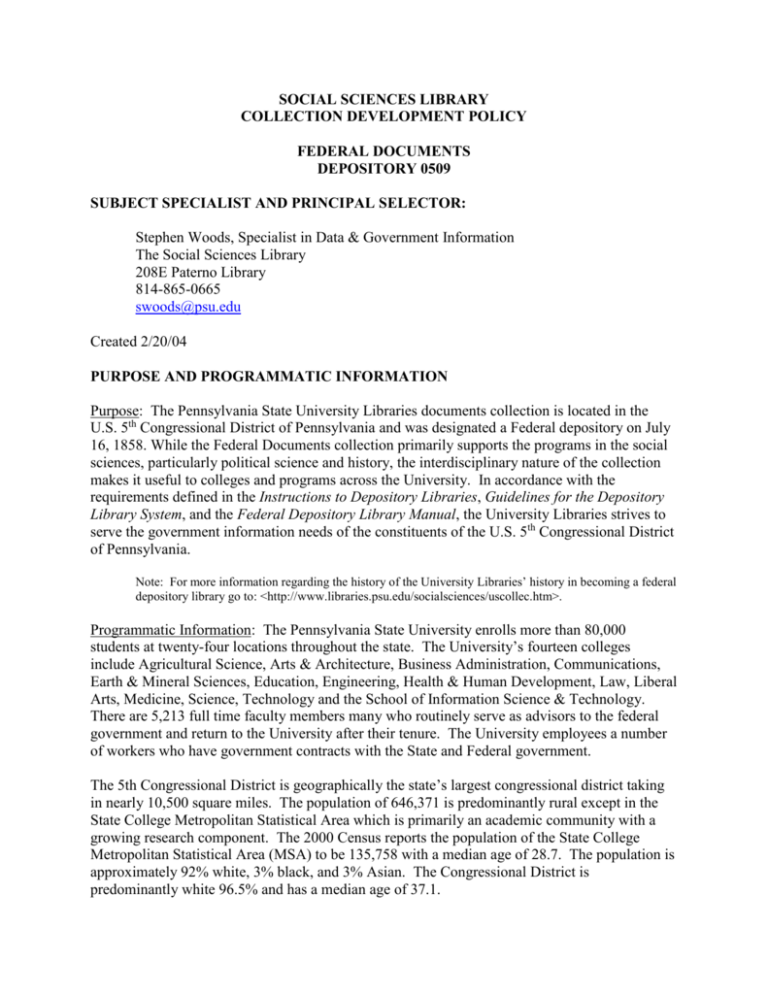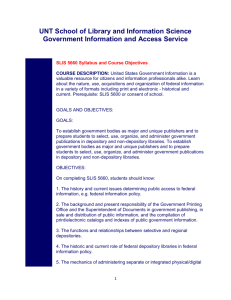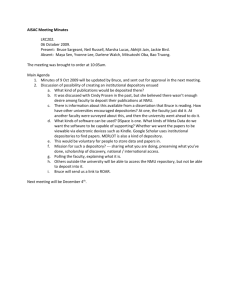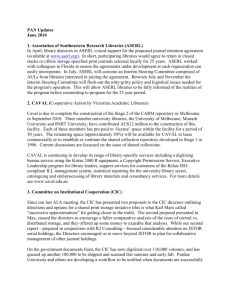Federal Documents Collections
advertisement

SOCIAL SCIENCES LIBRARY COLLECTION DEVELOPMENT POLICY FEDERAL DOCUMENTS DEPOSITORY 0509 SUBJECT SPECIALIST AND PRINCIPAL SELECTOR: Stephen Woods, Specialist in Data & Government Information The Social Sciences Library 208E Paterno Library 814-865-0665 swoods@psu.edu Created 2/20/04 PURPOSE AND PROGRAMMATIC INFORMATION Purpose: The Pennsylvania State University Libraries documents collection is located in the U.S. 5th Congressional District of Pennsylvania and was designated a Federal depository on July 16, 1858. While the Federal Documents collection primarily supports the programs in the social sciences, particularly political science and history, the interdisciplinary nature of the collection makes it useful to colleges and programs across the University. In accordance with the requirements defined in the Instructions to Depository Libraries, Guidelines for the Depository Library System, and the Federal Depository Library Manual, the University Libraries strives to serve the government information needs of the constituents of the U.S. 5th Congressional District of Pennsylvania. Note: For more information regarding the history of the University Libraries’ history in becoming a federal depository library go to: <http://www.libraries.psu.edu/socialsciences/uscollec.htm>. Programmatic Information: The Pennsylvania State University enrolls more than 80,000 students at twenty-four locations throughout the state. The University’s fourteen colleges include Agricultural Science, Arts & Architecture, Business Administration, Communications, Earth & Mineral Sciences, Education, Engineering, Health & Human Development, Law, Liberal Arts, Medicine, Science, Technology and the School of Information Science & Technology. There are 5,213 full time faculty members many who routinely serve as advisors to the federal government and return to the University after their tenure. The University employees a number of workers who have government contracts with the State and Federal government. The 5th Congressional District is geographically the state’s largest congressional district taking in nearly 10,500 square miles. The population of 646,371 is predominantly rural except in the State College Metropolitan Statistical Area which is primarily an academic community with a growing research component. The 2000 Census reports the population of the State College Metropolitan Statistical Area (MSA) to be 135,758 with a median age of 28.7. The population is approximately 92% white, 3% black, and 3% Asian. The Congressional District is predominantly white 96.5% and has a median age of 37.1. Major employers outside of the University include: Cerro Metal, Raython (electronics for the Department of Defense), Murata – Erie (electronics), Rutgers Nissi (Chemical). Tourism and recreation are the district’s economic mainstays. The district includes all of 11 counties and parts of 6 others. The Pennsylvania State University Libraries (0509) and Mansfield University (0515A) are the Federal Depository Libraries serving the Pennsylvania’s 5th Congressional District. There are two other depository libraries within the Penn State library system: Penn State Dickinson School of Law (0528A) and Penn State New Kensington (0512B). SCOPE OF THE COLLECTION The Pennsylvania State University Libraries collects 81.5% of materials distributed in tangible formats through the Federal Depository Library Program and 100% of those made available via the Internet. The University Libraries also purchases through the DOCUMENTS FUND supplemental collections for purposes of preservation and reference tools to provide bibliographic access to the collection. I. Materials Collected New depository item numbers are initially selected through surveys conducted by the U.S. Government Printing Office. The Federal Documents selector reviews the survey, chooses or rejects item numbers in coordination with appropriate subject selectors. The broadest range of curricular and research needs is considered in item number selection as well as requests from members of local community. A. Languages Collected. The U.S. Government publishes primarily in English. A small amount of materials are published in Spanish. Spanish materials are not selected. B. Chronological Limits. The Federal Documents collection in the Pennsylvania State University Libraries dates back to 1858. The collection contains documents back to the 1st congress primarily through the collection known as the Serial Set comprised of many of the old Senate and House Journals. C. Major Publishers. Most publications are published by the Government Printing Office or outsourced by the government to other publishers (i.e. Journal of the National Cancer Institute is published by Oxford Press) and distributed through the depository program. Publishers of supplemental materials and reference tools purchased with funds from the Documents Fund include: Bernan Press, LexisNexis Academic and Library Solutions, Congressional Quarterly Press, William S Hein and Company and Readex (Newbank). D. Reference Works. The Federal Depository Manual (3.2) maintains that depository libraries should provide basic access to the materials by purchasing non-depository guides, catalogs, indexes and reference tools that will enhance the collection. These materials are purchased using the Documents Fund. Policies related to these materials are discussed in the Documents Fund Collection Development Policy Statement. Materials received through the depository library program are reviewed for consideration as reference materials. A number of ongoing titles are considered core reference works. Including but not limited to: CFR, Statistical Abstracts of the United States, United Statutes at Large, Presidential Papers, United States Code and United States Government Manual. F. Periodicals. One of the true strengths of the federal depository library programs publications are the broad number of topics covered in significant serial titles. These range from statistical series such as the Current Population Reports from the U.S. Census Bureau to scholarly publications like Environmental Health Perspectives from the National Institutes of Health. Note: for a sample list of electronic only titles go to the University of Louisville’s web site < http://library.louisville.edu/government/periodicals/periodall.html>. Not all government periodicals and series are available electronically. H. Video/DVD Collections. Generally selections for these formats are not included in the libraries profile. However, certain pertinent government agencies are sending out information on DVDs relevant for our users. For example the 2000 Census is being distributed in DVD format. These are being selected. I. Generally Excluded. When applicable, decisions between depository formats are based on factors unique to the individual title, including: Usability of format Anticipated need for circulation Shelf space of the paper copy Timeliness of the various formats Anticipated physical longevity of the formats Existence and/or quality of electronic software Alternative formats already held by the library The Specialist in Data & Government Information in the Social Science Library at University Park serves as the University Libraries’ liaison to the Government Printing Office (GPO). The initial point of depository receipt and processing is done by the Social Science Work Group. As federal documents may be on any subject and may be required by users of any subject library of campus, close cooperation between the selector for Federal Documents and the other selectors is necessary. Item numbers are usually rejected for one of three reasons: Subject is Out-of-scope Material Not for Academic Use (i.e. Programmed texts at an 8th Grade level and periodicals meant solely for employees of a particular government agency are usually rejected. Format o Posters, which are difficult to store. o Looseleafs which require extensive interfiling. Often the subjects are pertinent to the collection and are re-selected when they become available in CD-ROM o Diazo microfiche when a commercial silver-haldide version already exists within the library (e.g. ERIC, ASI and CIS microfiche). o Braille publications when contents are duplicated by standard print. o Forms, except those frequently used by the local community (tax forms) or those needed to interpret statistical data, such as the Current Population Survey. Many of these forms are now available on the Internet. Review of Item Number Selections. Item numbers may be deselected throughout the year upon request of a subject selector in cooperation with the Federal Documents selector. Item numbers may be added during the annual cycle in June/July of each year. Given the size of The Pennsylvania State University Libraries collection and the number of federal depository item numbers (6,259), a zero-based review during the annual selection cycle is not always feasible. Instead, the Federal Documents selector will work with the appropriate subject specialist to review item numbers relevant to their subject area on a rotating basis and review the Technical Supplement for new item numbers added throughout the year, and verify that the previous year’s selection changes were made in the GPO data base. J. Areas of Focus/Strength. The Pennsylvania State University Library U.S. government collections are particularly strong in the following areas: Congressional materials, including committee reports and hearings, bills, and the Congressional Record. Statistical publications from executive branch departments and agencies Annual reports from agency programs and departments Laws and regulations Reports and studies (including historical materials) II. Electronic Resources. A. Core Resources Free Resources: AGRICOLS (Agriculture and Related Science) American FactFinder CenSTATS Consumer Health (Medline Plus) DOE Information Bridge ERIC ERIC Digests Federal R&D Project Summaries GPO Access GrayLIT Network HRSPROJ (Health Services, Grants and Contracts) HSTAT (Health Services/Technology Assessment Text) MEDLINE (PubMED) NASA ADS (Astrophysics Data System) NASA Technical Report Server National Criminal Justice Reference Service Abstracts Database THOMAS TOXNET TRIS (Transportation Research Information Service) U.S. Patent & Trademark Office - Full-Text Patent Database Fee Resources Associations Unlimited Congress Collection (Congressional Quarterly) Congressional Universe CQ Researcher CQ Weekly Reports (Congressional Quarterly) Declassified Documents Reference System EDRS Election and Voting Collections (CQ) FBIS National Journal NLM Gateway NTIS PAIS PolicyFile (Public Policy Research & Analysis) Statistical Universe (American Statistical Index) STAT-USA World News Connection (Contains Current FBIS) B. Related Collections Business Documents Fund Earth & Mineral Sciences Education Engineering Foreign Documents International Documents Life Sciences Political Science Sociology Criminal Justice & Law COORDINATING AND COOPERATIVE EFFORTS I. Related Funds: SocRef Law Micro Docs Intl Polsc II. Campus Locations. The bulk of the government documents collection is located in the Social Science Library at University Park. Relevant government documents are housed in the following subject libraries: Earth and Mineral Science, Maps, Life Science, Business, Arts and Humanities, Education, and Engineering. Some of the documents have been LC classed and are integrated into the general collection. Finally, there are documents that are located in the Annex. III. Data/Statistical Collections. The United States government produces a vast amount of statistical resources and numerical/geospatial data. Many of these resources are distributed through the depository program in a variety of topics: population, vital statistics, economic indicators, business and industry statistics, income, earnings, employment, energy, transportation, crime, defense, trade. o Numeric/Geospatial Data for the purpose of this policy is defined as machine-readable data files which are stored in a format which requires appropriate computer hardware and software to use. o Statistical resources are those resources produced from numeric and geospatial data. Statistics are frequently used to condense large amounts of information into a few numbers and in this context, provide a concise, descriptive summary. The libraries profile includes extensive coverage of statistical publications produced by government agencies. IV. OTHER CONSIDERATIONS A. Depository Claims. All significant publications (i.e. serials) missing from depository shipments and selected by the Library are claimed from GPO in a timely manner. These will be reviewed every three months by the Federal Documents selector to see if the claim should be followed up. Non-claimable publications missing from the depository shipments and selected by the Library are selectively claimed by the Federal Documents selector from the appropriate agencies. B. Replacements. Missing federal documents are difficult to replace due to their short imprint status. Paper replacements are seldom sought if the item is duplicated in another campus library or available on silver-halide microfiche (American Statistics Index or Congressional Information Service Collections). C. Weeding. Because The Pennsylvania State University is a research institution, most tangible depository materials are considered permanent additions to the collection. Depository materials may be weeded using the following guidelines set forth by the Guidelines: Determine whether titles in question appear on the List of Superseded Titles http://www.access.gpo.gov/su_docs/fdlp/pubs/suplist/index.html and may be discarded without offering to other depository libraries. Not all superseded titles are discarded, particularly CD-ROMs with monthly data which cumulates throughout the year. Publications intended to be withdrawn are forwarded to the Social Science Librarian Specializing in Government Information & Data, who determines whether they should be withdrawn or transferred to another location. Publications withdrawn from the collection are offered to the State Library of Pennsylvania (Regional Depository Library) and then to the Needs & Offers List. Duplicated non-depository publications or publications replaced by another format may be discarded provided that those documents of possible significance to another depository library are handled through the discard list. D. Public Access Consultation. All GPO depository collections and corresponding reference services are available to the public regardless of residency and free of charge. All tangible documents may be read and photocopied within the library. Circulation. Unless specifically designated as reference materials, documents may be circulated to The Pennsylvania State University students, faculty, and staff according to non-document circulation policies (time limits, recalls, etc…) in the various campus libraries. CD-ROMS located in the Social Science Library circulate by special permission of the Social Science Librarians if the libraries do no have the appropriate software or large quantities of data are needed. Circulation and inter-library loan polices for federal documents to the public are consistent with those for non-documents. Computer Workstations. The three to four year cycle of public workstations enables the University Library to meet GPO’s Minimal Technical Guidelines for at least one workstation in the Social Science Library. The Pennsylvania State University Libraries have initiated authentication for access to library workstations and allow guest passwords for the public. There are also LIAS workstations which do not require passwords, but have filters that limit the public to the libraries resources as well as MIL and GOV domains. Tangible Electronic Products. Software for diskettes and CD-ROMs will be loaded upon receipt for titles of anticipated use. Software will be loaded upon request within one workday for tangible electronic products which are not currently installed. Printing/Downloading. Lion cash cards may be purchased by anyone wishing to print from a workstation in the library. Users may also download to a floppy disk or use the CD-RW on the workstation in the Social Science Library. Reference Service. The Pennsylvania State University Libraries provides reference services regardless of University affiliation or residency. Every attempt is made to provide the correct answer for the user’s level of need. When an inquiry cannot be answered, it will be referred to a person, library, or government agency with specific contact information given.






